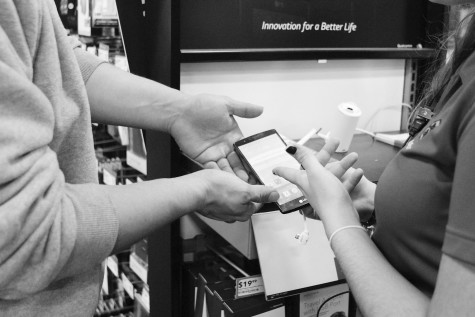Leasing leads to saving

Junior Abby Hornberger said she used to pay $300 up front and then pay $30 per month for her cell phone. Now, Hornberger pays $43 per month after switching to a plan where she no longer purchases her cell phone. Instead, she leases it.
Leasing cell phones differs for each cell phone carrier. For most carriers, leasing a cell phone requires paying a monthly fee for a certain amount of time. When that lease is up, the lessee can trade in the old cell phone for a new one, starting a new lease.
Jean Baptiste, a sales associate at Sprint in Northbrook, said Sprint offers different types of leasing plans. There is an iPhone Forever Lease in which customers can get a monthly lease for their iPhones on their accounts and pay $15 per month for a 22 month term. Whenever a new iPhone comes out, the lessees can trade their current phones for the new one. Another leasing plan Sprint offers for other cellphones and LG devices is much cheaper and lasts for 24 months, according to Baptiste.
Jim Kimberly, director of news relations for AT&T, said there is a leasing plan called AT&T Next. For AT&T Next, users pay a small fee up front to activate the phone, but instead of paying an additional cost at the beginning of their plan, they pay a monthly fee for the phone. Users of AT&T Next are not locked into a two-year contract, so users are able to get new phones quicker.
“People really like to have the latest and greatest device so, AT&T Next was created in response to that demand,” Kimberly said.
Baptiste said leasing a phone saves a lot of money.
“I can definitely tell you the average savings is anywhere between four to like literally $1000, and that’s on a yearly basis,” Baptiste said.
Senior Angeli Angelos said he would not choose to lease a phone.
“I just don’t think it’s viable for me to do that because you don’t own the phone essentially,” said Angelos. “[And] if you break it you have to pay the repair cost. If you want a new phone or you lose it, then you have to pay the full price.”
Baptiste said leasing is becoming a popular trend at Sprint.
“I would say right now 85, 95 percent [of customers] are leasing phones because when you do a lease your service is cheaper, and the surcharge, which is a charge that we used to charge when people did two year contracts, … goes from $40 a line … to $15 per line,” said Baptiste. “You save a lot of money.”
According to Hornberger, she still thinks it is the best choice for her.
“You can get a new phone more often, and that way it’s least expensive to get a new phone,” Hornberger said.

